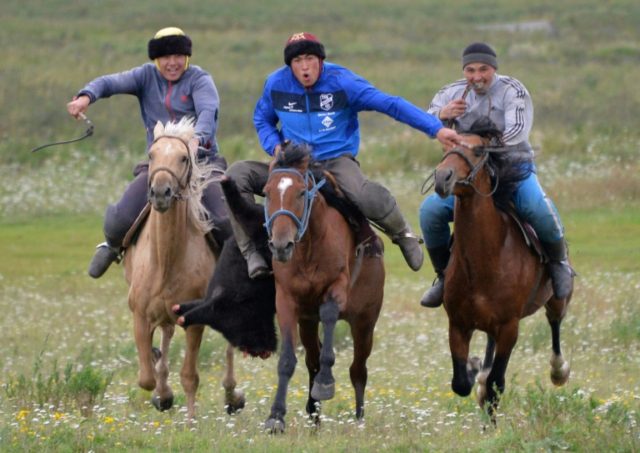Suusamir (Kyrgyzstan) (AFP) – In a melee of hooves and hands, a scrum of horseriders on the plains of Central Asia wrestle to get control of the ball — or in this case the carcass of a freshly-slaughtered goat.
After several minutes of shrieks and equine snorts, a rider from ex-Soviet Kyrgyzstan’s national team emerges clutching the carcass, triggering a frantic pursuit.
The game — called Kok-Boru (Gray Wolf) in Kyrgyzstan and Buzkashi (Goat Grabbing) in Afghanistan — is a warm-up for the second edition of the World Nomad Games to be held in September.
Organisers say the games — first staged by impoverished Kyrgyzstan in 2014 — are aimed at boosting nomadic traditions threatened by globalisation and should draw competitors from some 40 countries this year.
Events include age-old versions of wrestling, hunting and horse racing — and of course the eye-catching Kok-Boru.
“Some might say this is a cruel type of sport, but for us, it is something national, something that is ours,” Kyrgyz player Temir Moldokulov, 31, said of the sport, likened by some to an ultra-violent version of polo.
“At the games we will be representing not just our country, but our ancestors.”
– Preserving nomadic culture –
For a poor country like Kyrgyzstan that has faced two revolutions and oscillated between democracy and authoritarianism in its 25 years of independence, the Nomad Games have become a point of national pride.
This time round the number of nations sending competitors for the two-week event beginning September 3 on the shores of Lake Issyk-Kul has has nearly doubled since the first games two years ago.
The state has already released special edition coins and stamps to commemorate the games, whose logo is being worn on custom-made broaches by state television presenters.
Organisers cite a mission to “revive and preserve the culture, identity and ways of life of nomadic peoples in the era of globalisation” but many have aired concerns about cost overruns.
Recently the cash-strapped government admitted that the cost of rebuilding the stadium where many events will take place had ballooned from roughly $7 million (6.2 million euros) at the start of the year to over $16 million, for instance.
Nurdin Sultambayev, who heads the World Nomad Games 2016 secretariat says the event is part of a “long journey” and that the government will claw back its investment in future tourism revenues.
“This is a brand that can take our country forward,” Sultambayev told AFP, noting some expenses would be met by sponsors including Russian energy firm Gazprom, while declining to state the games’ total cost.
– A compelling spectacle –
The games will not stay in Kyrgyzstan forever — Turkey is to host the 2018 version — but traditionalists are optimistic that the buzz they create can help tweak sporting tastes in the country.
Overlooking a mixed male-and-female training session for Kyrgyzstan’s national team of mas-wrestling — a one-on-one stick-pulling competition whose origins can be traced to Russia’s Turkic-speaking Yakutia province — coach Talaibek Janybayev says sports such as his can be “unifying”.
“This is not boxing or wrestling, no-one is beating anyone up,” says Janybayev.
“There is just a 50-centimetre stick and simple competition — who is stronger? What’s more, it is a very economical form of sport to develop.”
Watched up close in a sweaty gym in the capital Bishkek, a mas-wrestling duel — full of grunts and often lasting less than a minute — is a compelling spectacle.
But when the games begin it will likely be overshadowed by sports like Er Enish — wrestling on horse-back — and Kok-Boru polo, cheered on by locals as well as curious foreign tourists, among them Hollywood action man Steven Seagal.
“The competition last time was weaker,” admits Moldokulov, who took part in the 2014 Kok-Boru tournament that saw Kyrgyzstan’s national side defeat its own reserve team in the final.
“Tajikistan, China… these were fairly competitive teams,” he said.
“But this year, Kazakhstan will send a Kok-Boru team for the first time. That will be real competition for us,” he said.

COMMENTS
Please let us know if you're having issues with commenting.